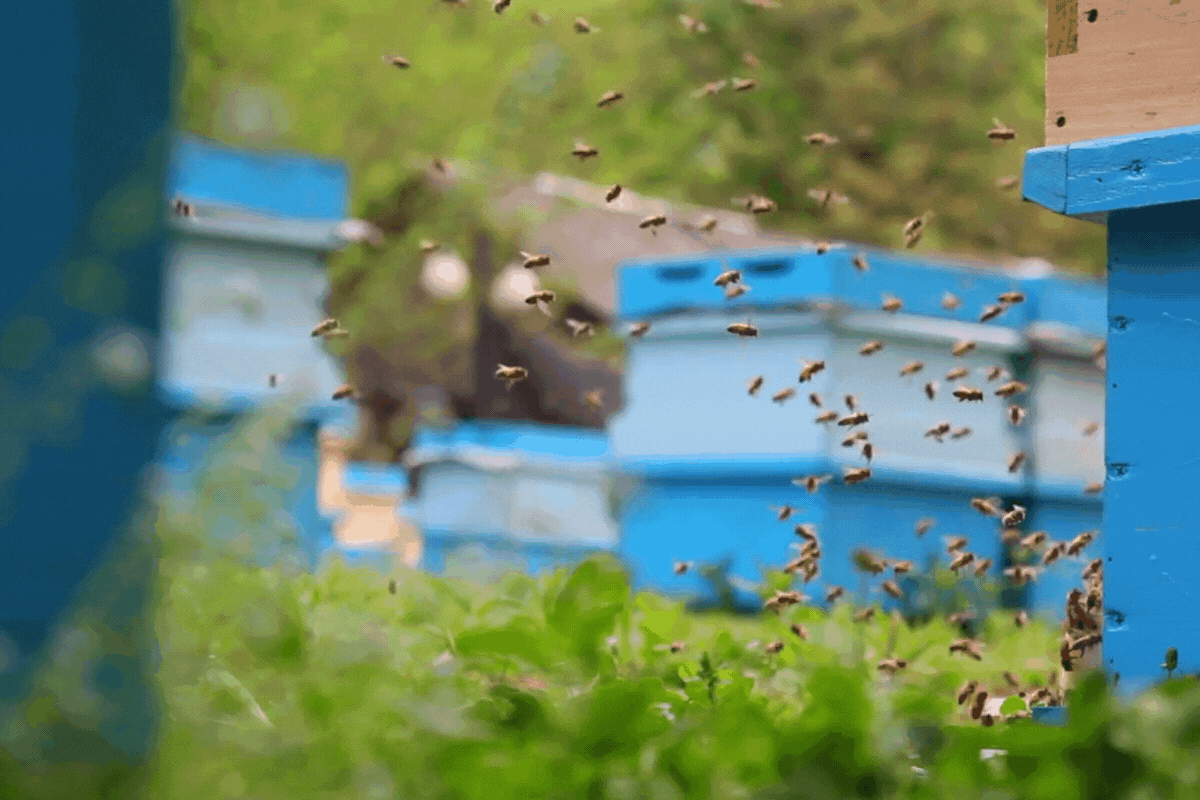Yes, bees can smell fear. But not in the way you may think. When humans feel fear, we excrete a pheromone that bees interpret as a threat. This fight or flight pheromone will cause bees to become aggressive.
One of my not so fond childhood memories is getting chased by a bee swarm. I ended up developing a fear of bees because of that. My mom tried consoling me by saying that the honeybees were more afraid of me than I was of them. Being the curious kid I was, I asked how the bees knew I was scared of them. The answer? A common phrase almost all of us have heard.
Bees can smell fear.
One thing about this industrious yellow insect is it has an amazing sense of smell. It’s so good scientists have even found success in detecting landmines with bees.
But fear and TNT are two very different things. So, do bees really smell your fear? Or is it simply another myth taught by our parents.
In this article, we’ll go into the details of how bees use their sense of smell to detect intruders and threats to their hives.
Let’s get started.
Can Bees Smell Fear?
The answer is yes and no at the same time. Fear is odorless, which means bees can’t smell your fear.
But, they do use their sense of smell somehow, right?
When certain stimuli induce emotions in humans – including fear – our body produces certain alarm pheromones. Bees can detect these pheromones and interpret this unique fear pheromone as a threat.
As a result, they let every other bee know about the anomaly’s existence – they send signals that something is up.
What bees do is differentiate between pheromones and determine which ones mean hunger, malice, or aggression against their hive and queen bee.
So yes, bees sense fear and we could say that they smell fear.
How Bees Use Their Sense of Smell
Bees pick up the pheromones our bodies produce when we’re scared.
When humans or other animals feel fright, they produce fear pheromones. For humans, the palate in the mouth is responsible for detecting the smell of pheromones. Then, the olfactory system directly alerts the limbic system, which deals with it by sending out chemical signals that produce the proper emotional responses – such as sweating, shaking, and increased blood flow.
This system works in the same way in bees as it does in humans. However, the human one is less sensitive. Pheromones are used to send signals through the body and – to others of the same species. But the twist is, that bees can easily smell these pheromones. The pheromones of humans and other animals, that is.
Bees don’t have a sense of smell like ours. Still, they know the smell of fear. And once guard bee’s antennae pick up your fear they transmit it to their fellow bees – alerting them about the fear. Bees know that fear is a sign that a creature is scared of them – and a frightened animal might attack them. More importantly, it might harm the hive. Bees sure do know what to do next.
A chain reaction starts in the beehive, and the bees communicate with the help of smell. They release pheromones through which other bees know there is a potential threat nearby. As a result, they step up the defenses of the beehive – once a bee smells unknown pheromones around the beehive.
Another use of their sense of smell is when worker bees arrive back at the hive smelling of solid sources of food. This scent, combined with the bee waggle dance, communicates the distance and direction of the food source.
What Makes Bees React Aggressively
Bees attack for one and only one reason – to ensure the safety of the hive. Alert bees do not engage the threat at once. First, they try to push against it to warn the threat.
Anyone who’s felt a bee sting wouldn’t want to get stung again. So, the first impulse when you hear a sudden buzzing around your ear would be to swat it away like you would swat away a fly – and while doing so you’d also feel a mild sense of panic and freak out a little.
Once you do that, the bee knows for sure you are a threat. It’ll judge you as one and attack. And it’ll release its own pheromones that will let the other guard bees in the hive become aggressive as well. As the bees nearby have confirmed you as a threat, soon enough you’ll have a battalion of like-minded bees who all perceive you as an enemy of the hive – a full school of bees will be after you.

How To Avoid Being Stung
Well, it all comes back to the advice my mom gave me. The bees are just as scared of you as you are of them. And this fear is contagious. In this case – fear equals threat.
The best way to avoid being stung is to not be perceived as a threat in the first place. So, not getting scared and remaining calm is the way out of this mess.
Consider the demeanor of beekeepers as they approach their colonies, maintain their hives, search for the queen, and harvest honey. They don’t run or make sudden movements.
Their calm nature prevents them from being stung or swarmed, often allowing them to remove their protective bee suits, veils, and gloves. Beekeepers also use smoke to overpower the bee’s ability to smell.
A good rule of thumb is to simply commit to wearing protective beekeeping apparel if you have any fear or stress whatsoever.
Bees, like honeybees, bumblebees, wasps, and hornets, will attack you or become aggressive as the last resort if you actively try to harm them.
Only after deeming you as an aggressive threat will bees sting you as a last resort. After all, bees can only sting you once before they lose their stinger and die. They will only chase you till you’re no longer a threat to the hive.
But, be sure to get as far away as quickly as possible. Bees can fly quite fast and travel far from the hive.
Fun Fact: Africanized honeybees are known to chase people for up to a quarter-mile.

